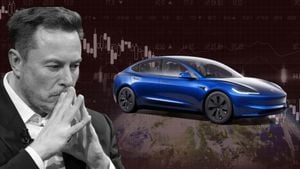Tesla Inc. (NASDAQ:TSLA) faced a substantial drop in its European sales this January, reporting nearly half the number of cars sold compared to the same time last year. According to data from the European Automobile Manufacturers’ Association, Tesla sold 9,945 vehicles across Europe, marking a stark decline of 45% from January 2024, when it sold 18,161 cars.
This sales slump contrasts sharply with the overall market for electric vehicles (EVs), which saw new battery-electric vehicle sales surge by 34% year-on-year, totaling 124,341 units sold throughout Europe. Electric vehicle sales are gathering momentum, with countries like Germany experiencing significant growth—54% increase—as the broader acceptance of EVs gains traction.
Despite the booming market for electric and hybrid vehicles, Tesla's market share within Europe dwindled, dropping to just 1% from 1.8% last year. This decline exposes the company to increased competition from both established automakers and new entrants. Ford, Volkswagen, and other major players strengthened their positions, with Volkswagen group sales rising by 5.4%, and hybrid electric cars witnessing substantial boosts.
The dip in sales has been attributed to various factors, including political controversies involving CEO Elon Musk. Since endorsing Donald Trump and critiquing European Union policies—calling it "undemocratic"—Musk's comments may have alienated some European consumers. These sentiments were echoed in reports of growing “Tesla shame” among some European drivers examining their loyalty to the brand.
Meanwhile, other brands benefited from Tesla's troubles. Chinese automaker SAIC Motor saw its sales jump by 36.8%, outpacing Tesla's numbers, with deliveries reaching nearly 23,000 units. The current sentiment suggests consumers may be shifting their preferences as competition heats up within the electric vehicle market.
Sales of hybrid-electric cars increased markedly throughout Europe, climbing 18.4% to account for 34.9% of the market share. Countries like France and Spain noted impressive gains, reinforcing the idea of growing interest among consumers for versatile vehicles.
Fuel-inefficient petrol car registrations have also struggled, seeing significant declines across the EU, with registrations down by 18.9% overall. The last month saw 290,014 hybrid-electric cars sold, contrasting with traditional petrol-engine vehicles, which remain under pressure, as sales saw decreases by as much as 28% in France and 24% in Germany, signaling changing consumer preferences.
The bleak January sales figures tie back to concerning trends also seen within Tesla's largest market, China, where the company experienced an 11.5% decline from the previous year, with January sales dropping from 71,447 to 63,238 units. This pattern is troubling for analysts as it indicates broader challenges for Tesla as it adapts within increasingly competitive markets.
Analysts on Wall Street currently view Tesla's stock as holding ground. The consensus rating stands at 'Hold,' driven by 13 Buy, 12 Hold, and 10 Sell ratings attributed to the company. The average price target is set at $351.38, signaling potential for positive movement, but for now, investors and industry observers alike will be closely watching how the company addresses these sales challenges.
Tesla's declining fortunes reflect the challenges of leading the electric vehicle space amid growing competition, consumer backlash toward the CEO's political provocations, and the complex interplay of market demand shifting rapidly. For shareholders and enthusiasts, the upcoming months will be pivotal as the company seeks to recover and possibly revitalize its standing within the electric vehicle market.



